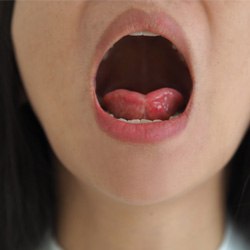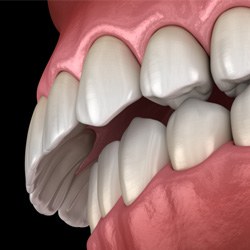Airway Management—Sachse, TX
Better Breathing for Better Health

Dr. Travis Rottman and our team can use a variety of dental techniques to not only improve the health of the mouth and teeth, but also a person’s ability to breathe properly.
If you or your child feel tired all the time no matter how much you sleep or have trouble swallowing, chewing, or breathing through your nose, we may be able to help.
It all starts with a consultation and screening, which you can schedule by clicking here.
Why Choose Sachse Family Dentistry at Woodbridge for Airway Management?
- Award-Winning Sleep Dentist in Sachse
- Proven Solution for Sleep Issues (Including Sleep Apnea)
- Viable Alternative to CPAP Therapy
What Is Airway Management?

Airway management looks at how the structure of the mouth affects a patient’s breathing, and this allows us to make positive changes by adjusting the teeth, bite, or using custom appliances. We utilize it to help children and adults dealing with sleep issues, mouth breathing, lip/tongue tie, excessive tooth wear, and more.
By opening up the airway, we can often resolve these problems, leading to both short and long-term benefits for a person’s dental and overall health (more on this below).
Common Types of Airway Issues

The orientation of the teeth and soft tissues in the mouth can lead to a narrowed or partially obstructed upper airway. This can stem from a multitude of factors, and some of the most common conditions we’re able to treat include…
Tongue and Lip Ties

Both the lips as well as the tongue are attached to a small band of tissue called a frenulum. They help keep the lips against the teeth when they’re at rest and ensure the tongue stays on the floor of the mouth when not moving. This all makes nasal breathing, both while awake and during sleep, feel much more normal and comfortable.
However, if a frenulum is too short, tight, or inflexible, this can lead to chronic mouth breathing and also make eating and speaking difficult or even painful (particularly for breastfeeding infants who can’t latch properly).
Sleep-Related Disordered Breathing or Sleep Apnea

The upper airway can end up being too small or constricted due to the natural development of the jaws. A lack of room in the mouth makes it easier for the airway to become obstructed throughout the night, which can directly cause snoring and sleep apnea. Dentistry can be used to open up the airway so that symptoms are reduced or eliminated entirely.
Malocclusion

“Malocclusion” is the technical term for a misaligned bite—you’re probably more familiar with words like overbite, underbite, crossbite, and open bite.
If the upper and lower jaw don’t line up, this can not only make the teeth crooked, but also restrict the airway. In addition to the sleep and breathing problems touched on above, the body may naturally try to force the teeth together to create a proper bite, which can cause unconscious grinding. Fortunately, this can usually be corrected with orthodontics.
Benefits of Treatment

As you can imagine, once we’re able to help a patient breathe properly, it has far-reaching benefits:
- More energy (no more exhaustion)
- More daily comfort eating and speaking
- Ability to eat a wider variety of foods
- Better sleep (no more snoring!)
- A more balanced and attractive smile
- Better focus and memory
